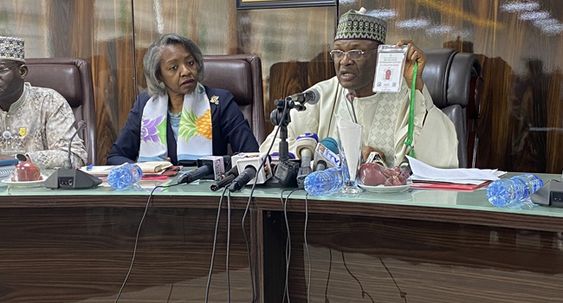Politics
INEC Announces Date for FCT Local Government Elections”

The Independent National Electoral Commission (INEC) has officially revealed the date for the Federal Capital Territory (FCT) local government elections, urging residents to participate actively.
The Independent National Electoral Commission (INEC) has set February 21, 2026, as the date for local government elections in the Federal Capital Territory (FCT).
The elections, set to take place across the six area councils of the FCT, are the only local government elections in Nigeria that are directly conducted by INEC.
During a consultative meeting with political party leaders held at the INEC Conference Centre in Abuja on Wednesday, INEC Chairman Professor Mahmood Yakubu announced that this decision adheres to Section 28(1) of the Electoral Act 2022. This legislation mandates that the commission must issue an election notice no less than 360 days prior to the elections.
The most recent FCT local government elections were held on February 12, 2022. The current chairpersons and councillors are expected to serve until their terms conclude in 2026.
As a result, the Commission has authorized that the 2026 Area Council election in FCT be held on Saturday, February 21st. Voting will occur at all designated Polling Units across the 68 constituencies to elect six Area Council Chairmen and 62 Councilors,” stated Yakubu.
The electoral commission announced its intention to release the election notice by February 26, 2025. The party primaries are anticipated to take place from June 9 to June 30, 2025.
Professor Yakubu additionally provided information on INEC’s upcoming initiatives, such as the restart of the nationwide Continuous Voter Registration (CVR) process and finalizing pending bye-elections.
Regarding the issue of by-elections, Yakubu disclosed that since the inauguration of the current National and State Assemblies in June 2023, there have been 23 vacancies across various constituencies.
Yakubu mentioned that bye-elections are unpredictable, unplanned, and challenging to organize ahead of time. Furthermore, some bye-elections result in additional ones. For instance, there have been cases where a serving member of the House of Representatives from a Senatorial District wins the by-election for that district’s senate seat, creating another vacancy.
As a result of winning the bye-election to the House of Representatives, a State Assembly member’s move created an empty seat in the State Assembly. This chain reaction turned one bye-election into three separate contests. These elections are not only expensive but also distract the Commission from its broader electoral duties and responsibilities.
Since 2016, over the past nine years, the current Commission has been promoting a more cost-effective way to fill vacancies, similar to practices in various jurisdictions worldwide. We have also urged stakeholders and political parties to support this initiative and called on the National Assembly to amend legislation accordingly.
Three weeks ago, we revisited this position during the defense of our 2025 budget before the joint committee of the Senate and House of Representatives at the National Assembly. We are pleased to see more Nigerians joining in on this advocacy. By working together, we aim to continue reforming and enhancing our electoral process.
